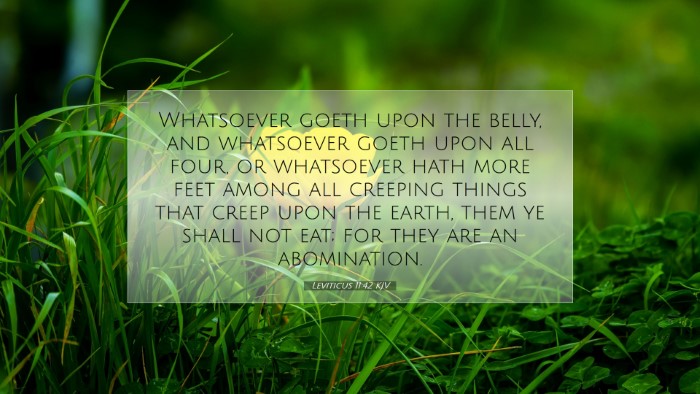Commentary on Leviticus 11:42
Verse: "You shall not eat any of these; you shall not touch their carcasses; they are unclean to you." (Leviticus 11:42)
Introduction
Leviticus 11 is central to understanding the dietary laws that the Lord imposed upon the Israelites. This particular verse serves as a pivotal reminder of the holiness and distinction that God desires among His people. In this commentary, we shall draw insights from various public domain commentaries, including those of Matthew Henry, Albert Barnes, and Adam Clarke.
Contextual Overview
The laws prescribed in this chapter are part of the broader covenant framework that established Israel as a holy nation. These dietary stipulations are not mere health regulations but are deeply rooted in the identity of God’s chosen people. Therefore, understanding Leviticus 11:42 requires us to consider the theological implications of holiness and separation as represented by clean and unclean animals.
Insights from Commentaries
Matthew Henry's Commentary
Matthew Henry stresses the importance of distinguishing between clean and unclean animals. He observes that the prohibition against eating unclean creatures is a call to holiness. He notes, "What God has declared unclean should be regarded as such by His people, as an illustration of their need to avoid sin." Henry points out that this teaching of separation is emblematic of the larger call for believers to be set apart from worldly practices.
Albert Barnes' Notes on the Bible
Albert Barnes enhances our understanding by remarking that this command does not merely concern dietary restrictions; it reflects a moral and spiritual principle. He explains, "The distinction made here serves as a metaphor for the spiritual distinctions that followers of God must observe in their lives." Barnes emphasizes that the unclean animals represent what is spiritually detrimental, and thus avoiding them is akin to rejecting spiritual impurities that draw one away from God.
Adam Clarke’s Commentary
Adam Clarke provides additional depth by noting that the specifics of clean versus unclean would be familiar to the Israelites, deeply embedded in their cultural and social practices. He asserts, "God provided these laws not only for dietary discipline but to instill a greater sense of spirituality in everyday life." Clarke also highlights the physical and spiritual implications of consuming unclean animals, stressing the need for the faithful to remain vigilant against anything that might defile their relationship with God.
Theological Reflections
The exploration of Leviticus 11:42 leads us to several theological reflections. Firstly, there is a significant link between physical cleanliness and spiritual purity. The Israelites were not to partake of foods that God deemed unclean, reflecting an overarching theme of holiness — a character trait of God.
Additionally, this verse invites the believer to consider their own lives. Although Christians are not bound by Old Testament dietary laws, the principle of being separate and distinct in a secular world remains. The pursuit of holiness is as paramount for believers today as it was for the Israelites.
Moreover, this passage emphasizes obedience. The command to not touch the carcasses illustrates that one’s approach to God should be characterized by respect and adherence to His standards. The application of this principle can be seen in New Testament injunctions to abstain from behaviors that draw us away from God’s holiness.
Practical Applications
Reflecting on the insights from Leviticus 11:42, there are several practical applications for contemporary believers:
- Discernment: Just as the Israelites had to discern between clean and unclean, modern believers are called to exercise discernment in their choices, be it in entertainment, relationships, or theology.
- Holiness: Pursuing holiness should be a daily commitment, considering how our actions reflect our faith and relationship with God.
- Obedience: An attitude of obedient faith is essential. Like the Israelites who were asked to adhere to God’s laws, Christians are called to trust and follow God’s commands.
- Separation from Worldliness: In a world that increasingly blurs the lines between right and wrong, believers are encouraged to remain distinct, drawing upon the principles laid out in Scripture.
Conclusion
Leviticus 11:42 stands as a reminder of God's intentions for His people. Through the reflections of Henry, Barnes, and Clarke, it becomes evident that these ancient laws bear timeless truths. They guide us toward living a life that acknowledges God’s holiness, embraces spiritual cleanliness, and encourages a vibrant pursuit of obedience to God’s will. May we carry the lessons from this passage into our ministries, studies, and daily living, inspiring others to seek after God in all things.


